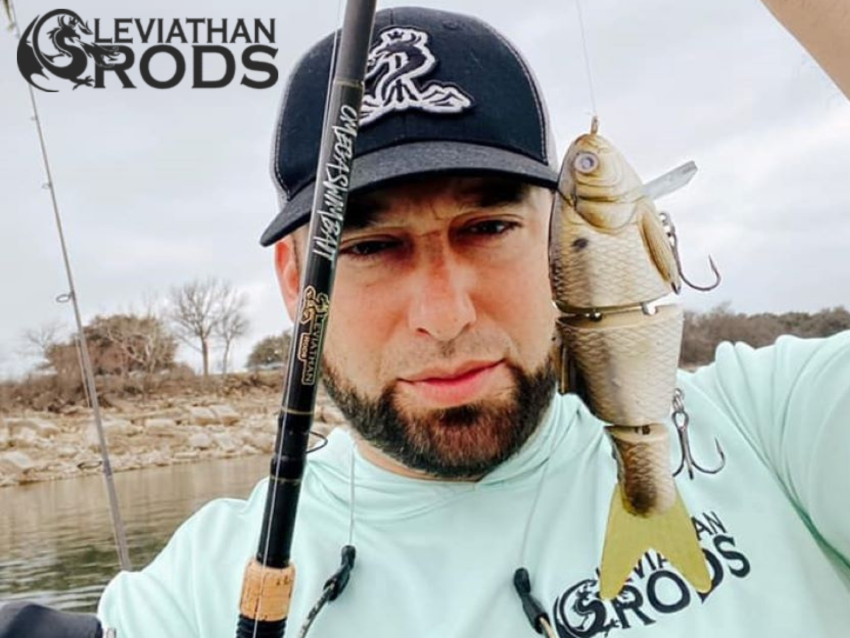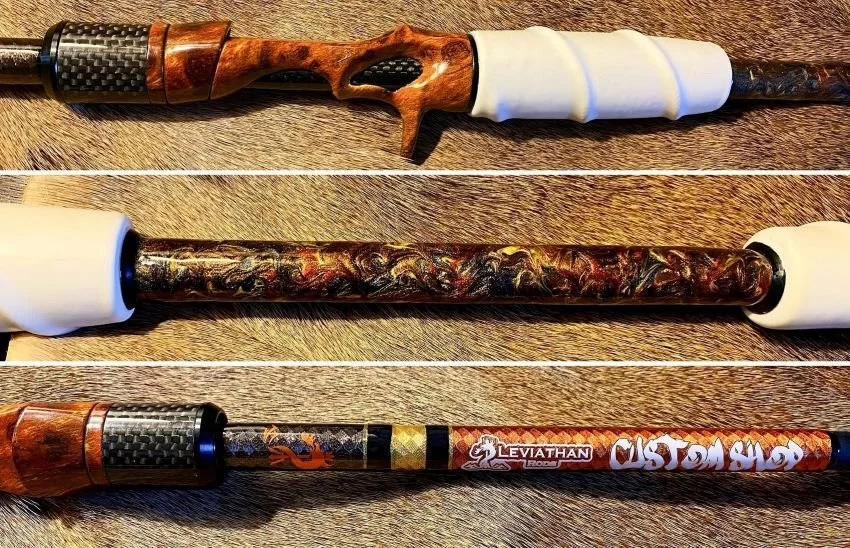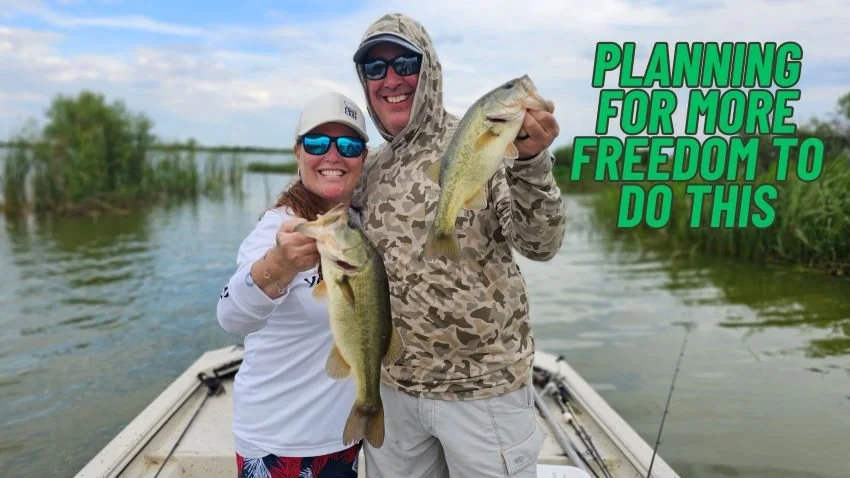Eric Gomez Describes His Leviathan Undertaking
As I’ve moved deeper into the swimbait world, I’ve realized that the big bait subculture is fiercely loyal, extremely demanding when it came to product quality and remarkably diverse. While I wasn’t surprised to find out that one of the most respected rod makers in the genre was from Texas, I was shocked to learned that we’d gone to the same law school in New York City, albeit a couple of decades apart.
Eric Gomez, founder of Leviathan Rods, builds a full lineup of custom-quality swimbait sticks that have earned near universal-praise. Moreover, he hasn’t been content to rest on the laurels of his two Ivy League degrees – he’s the consummate multitasker, with strong feelings about how he wants to live his life and run his business. I was glad to catch up with him this week, and probably thankful that it didn’t happen sooner. If I’d known him in law school, I might have paid even less attention in Torts and Civil Procedure. As far as I know, most of my classmates couldn’t tell a Pizz from promissory estoppel.
Here's the story of Eric’s rod company in his own words:
HPFC: How and why did you get started building rods?
GOMEZ: I started building fishing rods in 2014 or 2015, when I got my first rod building kit. That was through Mud Hole, which is where a lot of rod builders start. Mud Hole has got a terrible name but they’re kind of the go-to supply house for custom rod builders and they’re really good for hobby builders. They’re not good for your OEM production builder. I built my first rod and really enjoyed the creative process and I went from there.
You hear the line about, “I sold to family and friends and it just took off.” I don’t know if it really did that. I just started building and I took rods to a lot of shows and retail shops to see if they would buy them. I didn’t thing about sales or margins or what retail stores were looking for. I literally loaded up a bunch of custom rods at prices that were way too high and put them in my car and drove around Central Texas to different tackle stores trying to see if they would buy them. I got humbled and knocked down and laughed at. I had to learn the hard way, had to get talked to by retailers, and kind of adjust from there.
HPFC: Were those early rods swimbait sticks?
GOMEZ: Texas has great saltwater fishing. That’s really where my passion is, so I started off making coastal rods.
HPFC: Where did the name “Leviathan” come from?
GOMEZ: Leviathan is based off Job chapters 41 and 42 in the Bible. It’s kind of a mythological creature. It’s funny how many different ways people butcher the pronunciation. We get every kind of way you can struggle with a few syllables and it gets really creative. After some good prayer I drew out the logo that we still use today in one shot. I did it with pencil and copy paper and stored it into my computer and had it vectorized. It’s the same one from way back in the day.
It's a faith-based company, although I don’t really believe in using my faith to sell product. I don’t think people should buy our rods because I’m a Christian – I think they should buy our rods because they’re the best rods out there. I try to make fishing rods that bring glory to God, that make our community a better place to be. That’s the big driver of why we’re in this business. It’s not just to turn a profit and have people pat me on the back. I really try to do this to make a difference. In that way it’s kind of a ministry. I’m a pastor on the weekends as well.
HPFC: So you’re a full-time attorney, you have a rod company, a family, and you’re a pastor on the weekends? How do you find the time for all of those things?
GOMEZ: I don’t know. People ask me that all the time. I volunteer at my kids’ schools every morning before I come to work. I’m also on the board of a non-profit that I really care about. We give from every rod we sell to Foster Village, which is a non-profit foster kid resource here in my hometown. They’re becoming national because of their great work. So I have no idea. Whatever the fire drill is, that’s what I focus on. I just shift. I would be lying if I said I was successful in every one of them. Every one of them is compromised to some degree. So I’m definitely not doing this full-time – full-time is my legal practice. I’ve hired employees and workers who help me. I think it has taken off because we not only have a great product, but we also have a great story. I was a foster kid, that’s why the whole foster thing is really important to me. I’m trying to give back.
HPFC: So if saltwater was your entry point, how did you make the transition to being perhaps best-known for your swimbait rods?
GOMEZ: Whether you’re practicing law or being a dad or anything else, you have to have mentors, and I had some good mentors. It helps to find someone who’s a few steps ahead of you to help you out. You can make a company out of saltwater rods, but most of the country doesn’t have access to saltwater. That’s a natural market limitation on your ability to sell. When I realized that was going to be difficult, I went over to making what people want. I remember the first rod I sold to a stranger – I was blown away that a stranger would actually buy a rod. You find yourself agreeing to make an offshore tuna rod. I’ll figure it out. And then you’re researching how to make a tuna rod. I remember selling centerpin salmon rods to a store in Vancouver. I had never even seen a salmon in the wild when I was building those rods, but I researched, talked to a lot of people who fished that way, and built the best rod I could. I was trying to build everything – fly rods, bass rods, everything, just to try to make sales, and to try to grow the business and the brand. The problem with that is you stretch yourself out too far and you don’t really get recognized in a particular area. You can’t do it all.
I had some good mentors like Alex Maslov, the CEO at North Fork Composites, and he told you can be the cheapest or you can be the best, but hardly anyone survives in the middle. There’s just too much competition. I didn’t want to be the cheapest, so I decided to be the best. That’s one thing that really resonated with me and I carry out to this day. Try to put out the best fishing rod you can, even if it means you’re going for the upper three or five percent of the market.
The other thing is to dominate a niche. That really helped me. As I said, at one time I had a line of saltwater rods, bass rods, fly rods, and then I had a custom shop on the side. There was just too much. That’s what led me to swimbaits. I had a few people say I should look into swimbait fishing, it’s really taking off. I took a look at it – had to get help from my partner Levi Jones, who was a few steps ahead of me in the swimbait area. He helped me to learn that. That was a great niche. We decided to plant our flag in swimbaits because I had such great people around me to help me figure out how to design a really good swimbait line of rods. I liked that it was its own subculture. It’s a lot like fly fishing. Fly fishing has its own little unique subcultures where you have to wear certain clothes, socks with Birkenstocks and cargo pants. I don’t know why that is. They’ve got their own music and their own beer they like to drink and swimbait fishing is a lot like that. It’s like ex-skaters and BMX guys. It’s flat bill hats and graphic tees. It’s got west coast influences and east coast influences. You really have to understand culture and it’s a unique challenge. When we first started doing swimbait rods in late 2017 or 2018, there really weren’t a whole lot of options. I really think that swimbait fishing is the fastest-growing niche in freshwater fishing in this country. We were fortunate to plant our flag early on. I was fortunate to get good counsel and advice from people to help me craft what I think are the best swimbait rods out there. I just really enjoy it personally and it gives us an opportunity to give back to our community through our philanthropy.
HPFC: What are the particular challenges associated with making a swimbait rod and what distinguishes Leviathan Rods?
GOMEZ: Swimbait rods are totally different from conventional rods. They’re longer – guys use on average around an 8 foot rod and if you can get a 9 foot rod that’s awesome. So they’re a lot like musky rods. The problem with musky rods is that there’s not a lot of them, believe it or not, and musky rods are historically pretty much workout equipment with a reel seat. They are super-heavy, unforgiving and will wear out a fisherman. Swimbait rods are sort of a hybrid between a musky rod and a traditional bass rod. They usually come in two different flavors – if you’re fishing with a soft bait you want a hard rod, and if you’re fishing with a hard bait you want a soft rod. That’s pretty much what it comes down to and then it’s just powers within those two categories. That’s really what it’s all about. With a soft bait with a jig-style hook, you want a stiffer rod to be able to set that jig hook into the fish’s mouth. When you’re fishing with hard baits, those are going to have treble hooks. With treble hooks you want a rod that’s more flexible because you’re just leaning into the hook set and allow the treble hooks to work. With a softer rod you get more action out of the baits as well.
Handle length is really important. There are companies that are trying to make a swimbait rod and I’ll look at their handle and I’ll be like, “Oh no. That’s not going to make it.” I’ve had guys where if my handle length is a quarter-inch too short or long they’re not going to buy it at all. They’re that particular. Handle length is that important because you want to be able to have leverage. You’re throwing a really heavy bait so where you put your hands on the rod is really important for casting and cranking. I like to tuck my swimbait rod under my armpit. You also need length because length equals casting distance. The longer the rod, the better but that gets hard logistically, trying to ship a 9 foot rod across the country. It’s too much of a challenge right now with shipping costs. That makes 8 feet the magical line, which is where a bunch of our rods are.
HPFC: You’re one of the few companies that has a swimbait-specific travel rod. Where did the market need come from for that and what are the additional challenges of building a multi-piece rod for swimbaits?
GOMEZ: Half of it is of a trend, and the other part of it is that swimbait fishermen are pretty mobile. A lot of these guys that are leading and shaping the industry right now are people who also have jobs. They’re professionals, traveling and going to different areas, and it just makes it a lot easier to be able to throw a rod in a backpack and carry it onto an airplane, or put it in a car like a little Accord and get to your fishing spot. I know people are buying those rods who don’t even travel. When I travel I take a three-piece bass casting rod that I make, throw it in my backpack and walk on the plane with it. I don’t trust my stuff to the TSA, so I’ll have my stuff with me. It’s half that it’s the hot new thing, half function.
So what distinguishes our rods? We have a true Made in America fishing rod and that’s a hard thing to pull off. Most of my competitors don’t. I’d be lying if I said that I knew for a fact that was an advantage. It’s an advantage to me in that we have total control over building our product. If we have difficulties I know about it. I can stop a run in production if we need to fix something. The people who are rolling our rod blanks, I’ve met them and shaken their hands and watched them do it. They live in this country and are depending on you paying them to help them with their kids in school. That’s just really cool to me. I really like that. The problem is that costs us a lot. Our rods cost – and I’m not kidding – probably three times what our competitors’ rods cost who are getting them from overseas, but that’s just where we’ve decided to make our mark – American-made fishing products. There’s quality-control and it helps us make a better product. That matters to me.
If you’d like to see Leviathan Rods in person and talk with Eric Gomez, they’ll have a booth at the upcoming Swimbait Universe Gathering. They are also available at retailers including MGC Fishing, Tackle Warehouse, The Hook Up, and soon will be at Tackle Direct.








